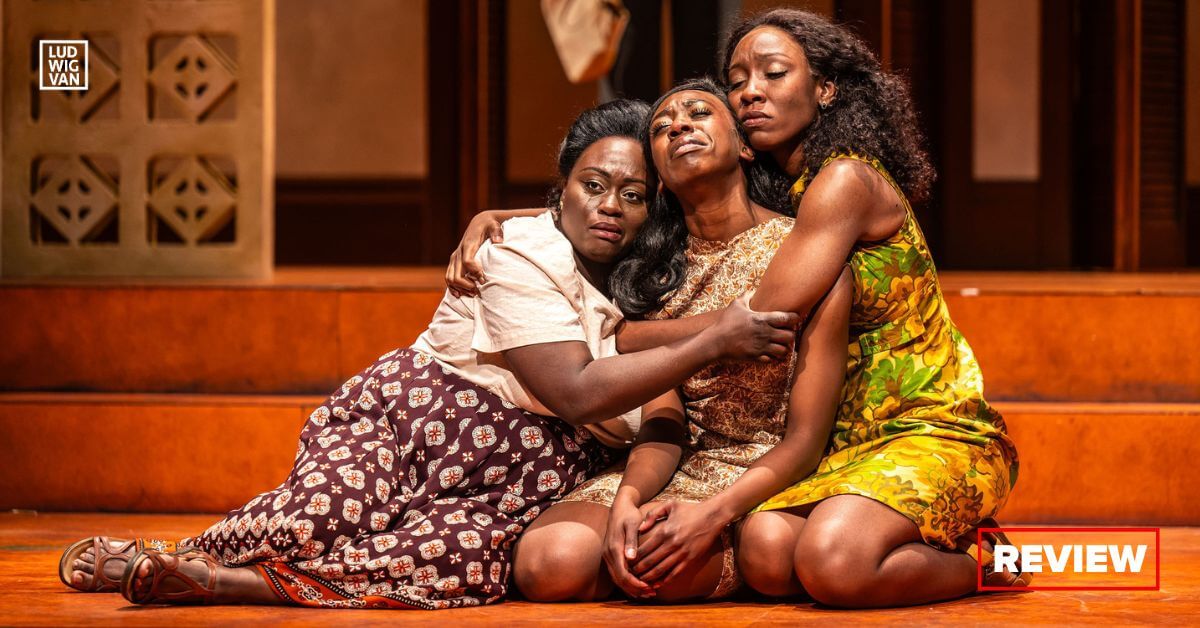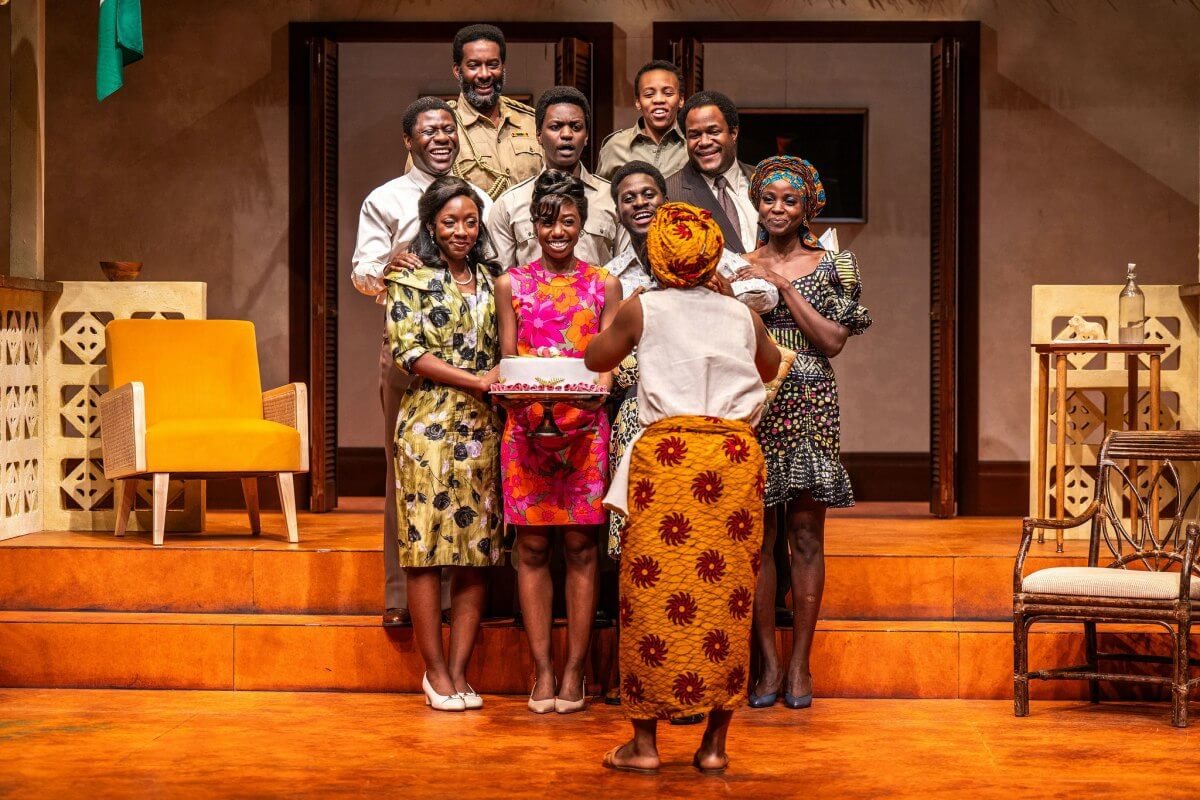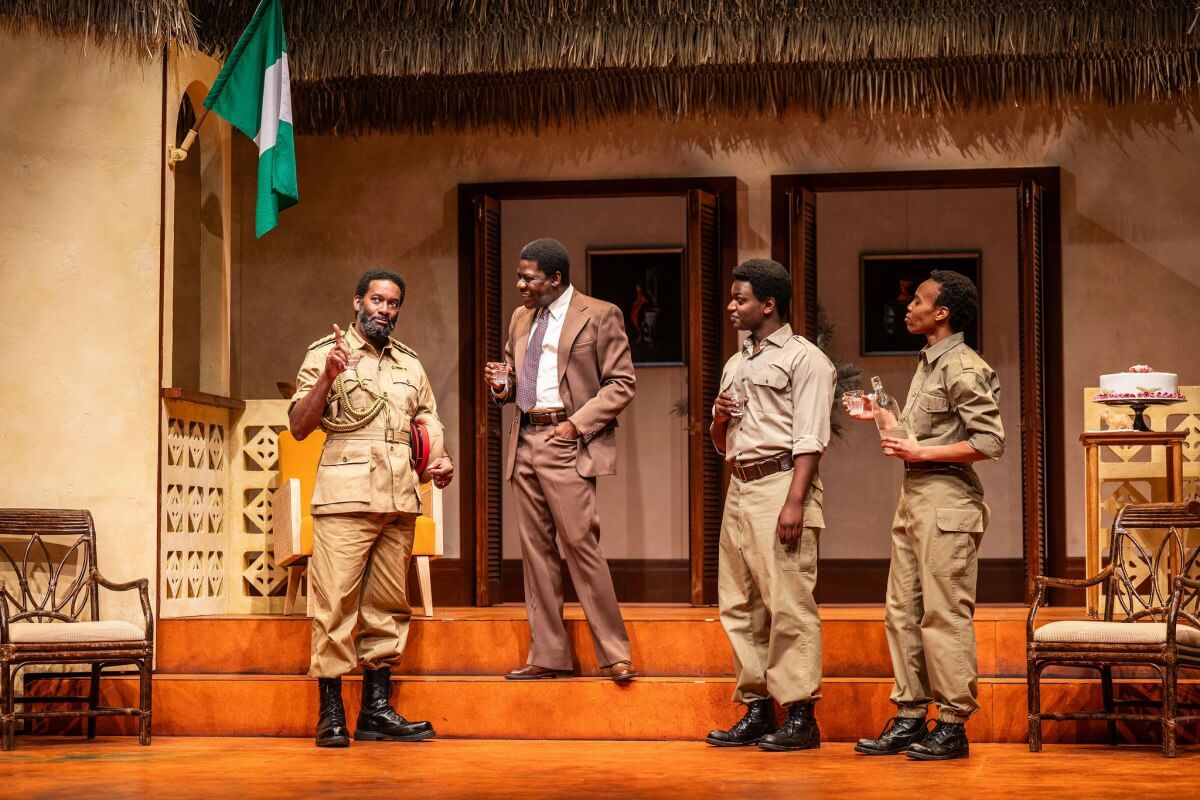
Soulpepper & Obsidian Theatre/Three Sisters, written by Inua Ellams, after Chekhov, directed by Mumbi Tindyebwa Otu, Young Centre for the Arts, closes Mar. 24. Tickets here.
I’m starting off this review with an observation that may incur ire in certain quarters.
The play in question is British-Nigerian playwright Inua Ellams’ Three Sisters which updates Chekhov’s classic 1900 play, to 1967-1970, and the Biafran War of Independence.
When we see Chekhov’s original play, we know it is set in Russia, and that the characters are speaking Russian, but the actors are rendering their lines in their natural voices. Not so in this production directed by Mumbi Tindyebwa Otu. Here, the actors have adopted African/Nigerian accents to the detriment of the play.
First of all, there is an enormous amount of talent on the stage, but you can tell that the accents have come easier to some than others. Second, the accents obscure words, particularly when the actors are turned away from us. Third, the accents affect pacing due to some actors speaking more slowly to get the accent out. During the intermissions, you could hear comments from people having difficulty with the accents, and I know two people who actually left after the first act.
If the original Chekhov is performed in natural English, could not also Ellams’ play? We know his Three Sisters is set in Nigeria. We know the characters are speaking in their native language, so why can’t the actors speak in theirs? And here’s the kicker — have you ever seen a Chekhov production where actors have put on Russian accents? The answer is never. Two dialect coaches are listed in the program. The theatre companies could have saved themselves some money.

That being said, Ellams has transferred every Chekhovian character and plot point into his play to an utterly faithful degree. The precursor to the action is that the sisters’ late but beloved father, a military commander, had moved the family to a rural outpost, leaving the sisters longing for their beloved Moscow. So too in Ellams play, only it is Lagos for which they yearn.
We have the oldest sister Lolo (Akosua Amo-Adem), a spinster school teacher who acts as the family’s matriarch. The middle sister Nne Chukwu (Virgilia Griffith) is trapped in an unhappy marriage to school teacher Onyinyechukwu (Tawiah M’Carthy), which leads to her affair with Ikemba (Daren A. Herbert), a charismatic military commander. Udo, the youngest sister (Makambe K. Simamba) dreams of Lagos the capital, and finding the beau of her dreams, while listening to popular English and American music.
There is the feckless brother, Dimgba (Tony Ofori), who has thrown away his academic potential while disastrously marrying beneath him to Abosede (Oyin Oladejo), who later becomes the terrorizing martinet of the household while cuckolding her husband.
Rounding out the Chekhovian characters are Udo’s two soldier suitors, the nice but bland Nagabo Nabea (Nmeri Ora), and the pathologically jealous and dangerous Igwe (Amaka Umeh), the beloved and elderly outpost doctor Eze (Sterling Jarvis), the equally beloved old nurse Nma (Ordena Stephens-Thompson), and a new addition to the cast — the maid Oyiridya (JD Leslie).

The bloody and brutal civil war began when the Igbo people of the eastern part of the country seceded from Nigeria and declared the independent state of Biafra. (The program has excellent background notes on the conflict.) Ellams is very clever as to how he incorporates both history and ethnic traditions into Chekhov’s plot. For example, he has set the locale in rural Owerri, in the heart of what will become the new Biafra.
The oldest sister is more than a hardworking school teacher. She is a fervent Biafran revolutionary who is virulently anti-British and its colonialism, which forced 250 different ethnic groups into one country. In Chekhov, we’re not really told why the middle sister got married, but in the play, Ellams has it as an arranged marriage when she was 12. In the original, the sisters loathe their brother’s wife for seemingly snobbish reasons, while Ellams has made her a lesser vessel because she is Yoruban while they are Igbo. The maid is a refugee whose husband was killed by Nigerians and she is bent on revenge. All the soldiers now fight for the new Biafra.
As well as the playing out of Chekhov’s personal stories, there is a lot of political talk which sometimes bogs things down. We also see the effects of the Nigerian blockade in terms of food shortages. The house becomes a hospital and refuge. Perhaps what is most interesting is that in Chekhov’s Three Sisters, the ironic humour is that beyond changes to the family, nothing much really happens over the three years that the play covers, which adds to the sisters’ ennui. In Ellams’ version, however, we go through the entire Biafran War, from declaration of independence to surrender.
Director Otu has done a masterful job in finding character, as well as moving large forces around the stage. Chekhov’s plays tend to have many characters so the stage can get crowded, but Otu is helped enormously by Joanna Yu’s clever set, comprised of a central hub, and two swing side flats. When the flats are closed, it is the front steps and veranda. When the side flats are opened, we see the interior of the house. We know that the house is supposed to be beautiful, built lovingly by the sisters’ late father, and it is.
Ming Wong’s attractive costumes for the women run the gamut from modern 1960s dresses to traditional Nigerian ethnic wear. The men are in authentic military uniforms or suits. Andre du Toit’s lighting bathes the stage in a sunny African glow, while John Gzowski’s atmospheric sound design incorporates found music as well as an originally composed score.
At over three hours in running time, the play asks a lot of the audience, particularly because of the accent issue, and the verbosity of the dialogue with war talk merging with the personal.
It can, at times, be a real slog. Nonetheless, one has to admire the first-rate acting ensemble and the fine production values, as well as Ellams’ valiant effort to make Nigerian history a focus for audiences at large.
Are you looking to promote an event? Have a news tip? Need to know the best events happening this weekend? Send us a note.
#LUDWIGVAN
Get the daily arts news straight to your inbox.
Sign up for the Ludwig Van Toronto e-Blast! — local classical music and opera news straight to your inbox HERE.
- INTERVIEW | Actor Diego Matamoros Takes On Icon Walt Disney In Soulpepper Production Of Hnath Play - April 16, 2024
- SCRUTINY | Opera In Concert Shine A Light On Verdi’s Seldom Heard La Battaglia Di Legnano - April 9, 2024
- SCRUTINY | Lepage & Côté’s Hamlet Dazzles With Dance And Stagecraft Without Saying Anything New - April 5, 2024



